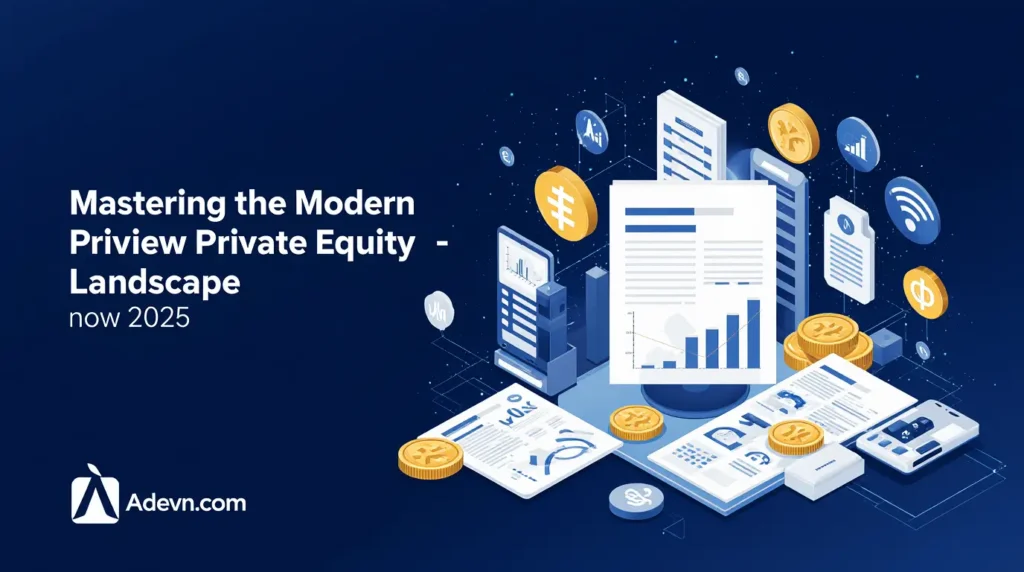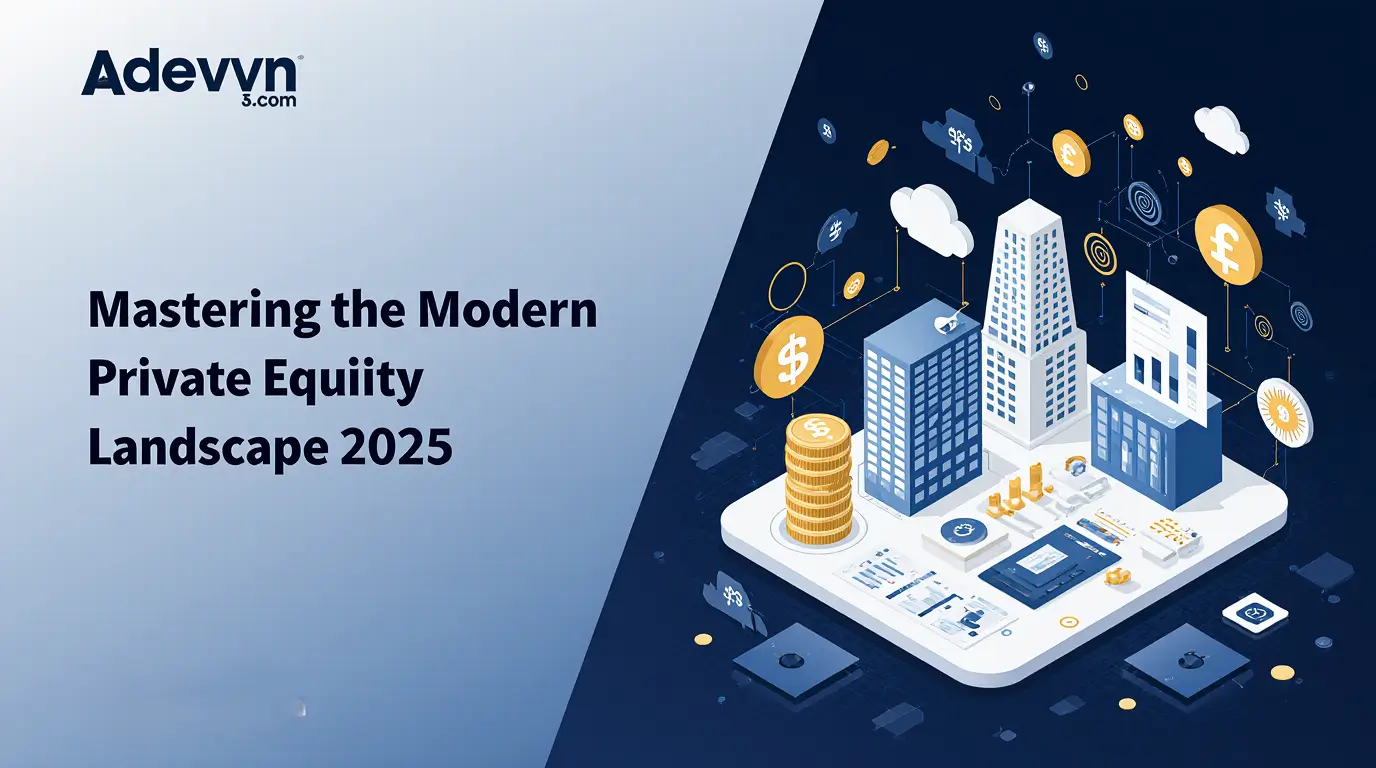Your learning increases your profit
Table of Contents
Navigating Private Equity’s Profound Transformation

So here’s the thing about private equity right now – it’s basically going through the biggest shake-up we’ve seen in years. I’m talking record amounts of cash sitting around waiting to be invested, and the whole game is changing faster than you can say “leveraged buyout.” get info about Conversational AI Banking
It’s not just about throwing money at companies anymore (thank goodness, because that was getting pretty boring). Now we’re seeing private equity trends that are actually reshaping how entire industries work. Companies are getting pickier, investors are asking tougher questions, and honestly? It’s making everything way more interesting.
The future of private equity isn’t just about who’s got the biggest checkbook anymore – it’s about who’s smart enough to navigate all this complexity while still making money. And trust me, that’s no small feat in today’s market.
If you’re trying to figure out what’s going on in this space (whether you’re investing, working at a portfolio company, or just curious), stick around. We’re about to dive into all the juicy details.
The Evolving Dynamics of Private Equity Deal-Making
Navigating Regulatory and Data Challenges
Okay, let’s talk about everyone’s favorite topic: compliance. I know, I know – about as exciting as watching paint dry, right? But here’s the plot twist: it’s actually become kind of a big deal in private equity.
The regulators have basically said “Hey, we’d like to know what you’re doing with all that money, thanks very much.” So now PE firms are drowning in paperwork about anti-money laundering, know-your-customer rules, and tax structures that would make your accountant cry.
But here’s what’s cool – the smart firms aren’t just grumbling about this stuff. They’re using it as an excuse to get their act together operationally. It’s like Marie Kondo came to private equity and said “Does this process spark joy? No? Then let’s make it better.”
Investors (the LPs, as we call them) are loving this transparency thing. They want to see everything in real-time now – kind of like how you can track your Uber driver, but for multi-million dollar investments.
Shifting Deal Landscapes and LP Sentiment

Here’s some good news for a change: deals are bouncing back! McKinsey’s latest report shows deal values jumped 14% in 2024. But – and there’s always a but – things are getting more concentrated. Instead of tons of small deals, we’re seeing fewer big ones. Think of it like the restaurant industry going from lots of mom-and-pop shops to fewer, bigger chains.
The money people (LPs) are being way pickier these days. They’re like that friend who takes forever to choose a restaurant because they’re reading every single Yelp review. They’ve got strong appetites for private equity investments, but they’re doing their homework like never before.
This means if you’re a PE firm, you can’t just show up with a fancy PowerPoint anymore. You need to prove you can actually create value, not just shuffle money around. The bar’s been raised, folks.
Creative Financing and Liquidity Options
Remember when deals were pretty straightforward? Yeah, those days are gone. Now we’ve got all sorts of creative financing tricks that would make a magician jealous.
PE firms are using preferred equity (fancy way of saying “I want my money back first”), seller notes (basically IOUs), and earnouts (where you get paid based on how well the company does later). It’s like financial Lego blocks – you can build almost anything.
The really interesting part? Some firms are offering monthly redemptions now, kind of like mutual funds. It’s making private equity more accessible to people who don’t want their money locked up for a decade. Pretty cool, if you ask me.
The Strategic Imperative of Technology in Modern PE

Technology as a Strategic Cornerstone
Alright, time for some real talk about technology in private equity. It used to be that having a good Excel model and a Rolodex full of contacts was enough. Not anymore.
The firms winning today are the ones treating technology like it’s as important as finding good deals. They’re using tech for everything – finding companies to buy, figuring out if they’re worth buying, and then making them better after they buy them.
It’s not just about looking cool with fancy dashboards (though those are pretty sweet). It’s about actually being able to do things faster, smarter, and with way less human error.
AI-Driven, Structured Data Systems and Investment Intelligence
Okay, I’m about to blow your mind with how AI is changing the game. These private equity firms are using artificial intelligence to crunch through massive amounts of data – we’re talking about analyzing thousands of companies, market trends, and financial reports in the time it used to take to review just one deal.
The AI isn’t replacing humans (yet), but it’s making them superhuman. Imagine having an incredibly smart research assistant who never sleeps, never gets tired, and can read through a thousand documents while you’re having your morning coffee.
LPs are eating this stuff up. They want real-time updates on how their investments are doing, and AI makes that possible. No more waiting for quarterly reports – now they can see what’s happening as it happens.
Solutions for Digital Sophistication
Here’s where it gets interesting. If you’re running a huge PE firm with billions under management, you can afford to build your own tech team and create custom solutions. But what if you’re a smaller, boutique firm?
That’s where companies like ‘bunch’ come in – they’re basically the tech department you can rent. Instead of hiring a bunch of programmers and data scientists, you can just plug into platforms that give you all the sophisticated tools the big boys have.
It’s kind of democratizing in a way. David can compete with Goliath, as long as David’s got good Wi-Fi.
Strategic Priorities for the Next Generation of PE Leaders
Operational Scale Without Bloat
Growing a PE firm is like renovating a house while you’re still living in it – tricky business. You want to get bigger and handle more deals, but you don’t want to turn into a bureaucratic nightmare where it takes six people to approve buying office supplies.
The secret sauce? Automation, cloud platforms, and knowing when to outsource stuff. Let the robots handle the boring tasks, and keep humans focused on the relationship stuff and big-picture thinking.
AI-Driven, Structured Data Systems
I keep coming back to AI because, honestly, it’s that important. If you’re not using AI to make sense of all your portfolio company data, you’re basically trying to solve a jigsaw puzzle blindfolded.
The future of private equity belongs to firms that can turn messy, unorganized information into clear insights that help them make better decisions faster.
Tech-Led Investment Intelligence
Deal sourcing used to be all about who you knew at the country club. Now? AI can spot potential targets before they even know they want to sell. It’s like having investment superpowers.
Machine learning can predict which companies might be struggling, which industries are about to boom, and which management teams are worth backing. Pretty wild stuff.
Customization as the Default
One-size-fits-all reporting is dead. D-E-A-D, dead. Every LP wants their reports customized to their specific needs, just like how everyone wants their Starbucks order made exactly right.
This means PE firms need to be like that friend who remembers exactly how you like your coffee – personalized service that makes people feel special.
Value Creation That Outlasts Cycles
Here’s something that might surprise you: the old private equity playbook isn’t working as well anymore. You know, the whole “buy a company, load it up with debt, and flip it for a profit” strategy? Yeah, that’s getting harder to pull off.
From 2010 to 2022, over 60% of PE returns came from financial engineering (fancy debt tricks) and multiple expansion (basically, market conditions making everything worth more). But those days are mostly over.
Now it’s all about actually making companies better – growing revenue, improving operations, and building businesses that can weather storms. It’s harder work, but it’s also more sustainable.
Cultivating High-Quality Deal Flow Through Relationship Intelligence
The Relationship-Driven Core of Deal Flow
Despite all this talk about AI and technology, private equity is still fundamentally about relationships. The best deals don’t come from cold emails or auction websites – they come from people you know calling you up and saying “Hey, I’ve got something you might be interested in.”
It’s like dating, but for business deals. The good stuff happens through mutual friends, not dating apps.
Best Practices for Network Cultivation
Get Your Story Straight: Before you start networking, figure out what kind of deals you actually want to do. Are you looking for tech companies? Manufacturing? Early stage or mature businesses? You can’t be everything to everyone.
Look in Your Own Backyard: You’d be amazed how many firms ignore the goldmine of relationships they already have. That lawyer who helped you with a deal three years ago? They might have five new opportunities sitting on their desk right now.
Let Technology Do the Heavy Lifting: Nobody likes updating CRM systems (seriously, it’s the worst), but relationship intelligence platforms can automate most of that boring stuff. Companies like Affinity can save you hundreds of hours of data entry, which means more time for actual relationship building.
Actually Care About People: This sounds obvious, but you’d be surprised how many people treat networking like a transaction. Send interesting articles, make introductions, check in when someone gets promoted. Be a human being, not a walking business card.
The Shift from Capital to Capability
Here’s the bottom line: private equity isn’t just about having money anymore. It’s about what you can do with that money that counts.
The firms that are winning these days have figured out how to blend old-school relationship skills with cutting-edge technology. They’re not choosing between human intuition and artificial intelligence – they’re using both.
Private equity trends are pointing toward a future where operational excellence, technological sophistication, and genuine relationship building aren’t nice-to-haves – they’re survival skills.
The future of private equity belongs to firms that can offer “sharper tools, smarter strategies, and a relentless focus on performance built to last.” That might sound like corporate speak, but it’s actually pretty accurate.
The good news? The fog is lifting on what actually works in this business. The firms that embrace this new reality while keeping their human touch are going to be the ones still standing when the dust settles.
Want to figure out how to navigate all this craziness? The smart move is finding advisors who get both the relationship side and the tech side of modern private equity. Because honestly, trying to go it alone in this environment is like bringing a knife to a gunfight – technically possible, but not recommended.
Mastering the Modern Private Equity Landscape now 2025
So here’s the thing about private equity right now – it’s basically going through the biggest shake-up we’ve seen in years. I’m talking record amounts of cash sitting around waiting to be invested, and the whole game is changing faster than you can say “leveraged buyout.” get info about Conversational AI Banking






